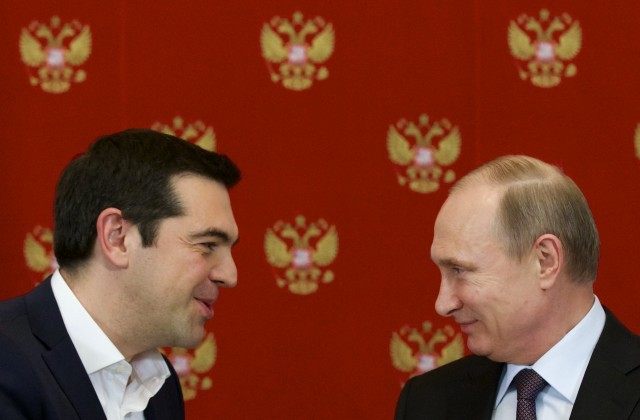ATHENS, Greece (AP) — The latest news on Greece’s financial woes on a day a big repayment to the International Monetary Fund is due and the country’s bailout program with European creditors ends (all times local):
12.32 p.m.
The Kremlin has brushed off speculation that it could lend money to Greece.
Greek Prime Minister Alexis Tsipras has visited Russia twice since April, stoking speculation that Athens could be seeking financial aid from Moscow which is eager to leverage the pro-Russian stance of the new Greek government.
A Russian deputy prime minister said earlier this month that Russia could consider a loan to Greece.
But Dmitry Peskov, spokesman for President Vladimir Putin, insisted that financial help is not on the agenda. Peskov said in comments carried by Russia news agencies that providing financial assistance to Greece “is a matter …. between Greece and its creditors and not ours.”
___
12.13 p.m.
The scale of the economic pain inflicted upon Greece by years of recession and strict austerity was evident in official figures showing unemployment in the country stood at 25.6 percent in March.
Eurostat, the European Union’s statistics agency, also said found that 49.7 percent of those aged between 15 and 24 were unemployed.
Though both rates are down from the peaks they hit a couple of years back, they do still show the scale of the economic retreat in the country. The ranks of the unemployed were major supporters of Syriza in its election victory earlier this year.
___
11.35 a.m.
Just hours before the European part of Greece’s bailout program expires, Europe’s main banking lobby group urged the country and its creditors to make a last-ditch effort to secure a deal.
But it insisted that the banking sector would weather any crisis.
The Brussels-based European Banking Federation said Tuesday that banks “have significantly reduced their exposures to Greece, limiting the risk of contagion through the banking system to other countries.”
It said “the European economic and financial system is sufficiently robust to deal with possible adverse impacts” once the program ends.
___
10.42 a.m.
The Greek Finance Ministry says it will open about 1,000 bank branches across the country for three days from Wednesday to allow pensioners without bank cards to make withdrawals — but for a total of just 120 euros ($134) for the week.
It was unclear why they would not be allowed to withdraw the 60-euro daily limit.
Meanwhile, irate depositors called in to television stations to report that some ATMs in Athens had run out of 20-euro notes, leaving them dispensing 50 euro notes only.
___
10.27 a.m.
Jean-Claude Juncker, the head of the European Commission, has made a last-ditch effort to help Greece get a bailout deal, provided Greek Prime Minister Alexis Tsipras campaigns for staying in the euro.
An EU official, official who asked not to be identified because of the sensitivity for the talks, called it “a sort of last-minute offer” before Greece’s bailout program runs out later and Athens needs to make a 1.6 billion euro ($1.8 billion) debt payment to the IMF.
Under the offer, Tsipras would need to write to Junker and other leaders saying he accepts the offer which was on the negotiating table last weekend. He would also have to change his position on Sunday’s referendum. Tsipras has said he will urge a vote against creditors’ proposals.
___
10.04 a.m.
The mood in European financial markets remained edgy amid growing expectations that Greece will not make a repayment to the International Monetary Fund.
Prime Minister Alexis Tsipras said Monday the payment would not be made if there is no deal with creditors over extending Greece’s bailout.
In early trading, the Stoxx 50 index of leading European shares was down 0.9 percent while Germany’s DAX fell 0.7 percent.
On Monday, stocks slid in the wake of Greece’s decision to call a referendum for July 5 on creditors’ bailout proposals and to impose controls on capital.

COMMENTS
Please let us know if you're having issues with commenting.